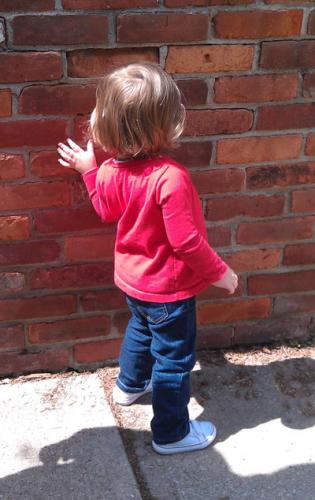What is your parenting style?
Brick wall, jellyfish and backbone families span the range of parenting methods.
Do you know what parenting style you use?  While exploring this topic with parents, I have found that often people will parent their children the same way that they were parented. But not always! Sometimes parents decide that they don’t want to repeat the way that they were raised, and they choose new methods that reflect their personal values.
While exploring this topic with parents, I have found that often people will parent their children the same way that they were parented. But not always! Sometimes parents decide that they don’t want to repeat the way that they were raised, and they choose new methods that reflect their personal values.
Michigan State University Extension offers educational, evidence based programs to help parents create a positive, nurturing and safe environment for their children. Learning a new style can be a challenge because it requires intentional effort and practice. But experts agree that families that provide consistent structure, combined with unconditional love and mutual respect produce children who become successful adults.
The three basic styles of parenting are often categorized as authoritarian, permissive and structured. Barbara Coloroso is a teacher, author and internationally recognized speaker who discusses parenting styles using images that help illustrate these concepts: She calls them the brick wall, jellyfish and backbone families. In her book, Kids Are Worth It! Giving Your Child the Gift of Inner Discipline, Coloroso describes characteristics of each.
In the brick wall family, parents are obsessed with order, control, and obedience. Threats and bribes are used to enforce strict rules and children don’t learn to think for themselves. There is no room for negotiation, and love is conditional based on conformity. Coloroso says children from brick wall families lack self-esteem and are at risk of sexual promiscuity, drug abuse and suicide.
The jellyfish family is at the other extreme, with no structure, rules or guidelines. There is a lack of consistency and safe boundaries. Arbitrary punishments and rewards take place in an environment of chaos, and emotions rule the behavior of parents and children. Coloroso says these kids are also at risk due to lack of self-esteem.
The backbone family is somewhere in the middle. Coloroso points out the six critical messages parents send to their children in the way they treat them:
1. I believe in you.
2. I trust you.
3. I know you can handle life situations.
4. You are listened to.
5. You are cared for.
6. You are very important to me.
A backbone family loves unconditionally and teaches children to think for themselves to solve problems. Children are at low risk because of the on-going interactions with their parents that foster self-esteem.
Although parents may use a mixture of styles at various times, striving to be a backbone family is best to help children develop inner discipline by combining love and respect with consistent, fair expectations.



 Print
Print Email
Email


